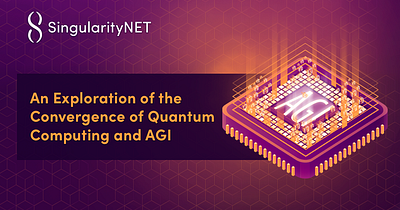
Dear Singularitarians,
The fields of artificial general intelligence (AGI) and quantum computing are two of the most exciting and rapidly evolving areas of technological research nowadays. Both promise to revolutionize our world and solve some of humanitys most pressing problems, however, they are fundamentally different in their approaches, nature, and objectives.
Quantum computing harnesses the peculiarities of quantum mechanics in the hopes of performing complex computations at unprecedented scales. AGI, on the other hand, aims to create machines that display the same rough sort of general intelligence as humans generalize what it has learned, including generalization to contexts qualitatively very different than those it has seen before.
At the recent Beneficial AGI (BGI) Summit 2024, one panel set out to explore the potential hardware and software architectures for AGI, and as part of that discussion, we cant forget to mention quantum computing. Are these two fields bound to someday converge, and how might they influence each other in the coming years?
A Brief Overview of Artificial General Intelligence
While the precise definition or characterization of AGI is not broadly agreed upon and is one of the subjects of study in the AGI research field, the term Artificial General Intelligence has multiple closely related meanings, e.g. capacity of an engineered system to
A Brief Overview of Quantum Computing
Quantum computing operates on the principles of quantum mechanics, using quantum bits or qubits. Unlike classical bits, which represent data as either 0s or 1s, qubits can exist in multiple states simultaneously, thanks to superposition. Not only that, qubits can be entangled, meaning the state of one qubit can depend on the state of another, no matter the distance between them. These properties allow quantum computers to handle complex, high-dimensional problems more efficiently than classical computers.
The intersection of quantum computing and AGI could potentially lead to significant breakthroughs in both fields
In a recent episode of the Mindplex podcast, our CEO Dr. Ben Goertzel sat down with Simuli CEO Rachel StClair, discussing topics such as the creation and application of compression technology in AI, the philosophical and technical challenges in scaling AGI, and the interplay between AI development and hardware advancements.
Some insights from their conversation shed light on the theoretical and practical implications of the convergence of quantum computing and AGI.
Dr. Ben Goertzel discussed the transformative potential of AGI systems that can upgrade their intelligence by leveraging quantum computing. He suggests that once AGI reaches a human-like level of intelligence, it will have the capability to access and process all existing knowledge in computer science and mathematics. This profound level of intelligence could enable AGI systems to innovate and design new hardware, possibly influencing quantum computing advancements.
In their discussion, Dr. Rachel St. Clair pointed out that we are approaching the physical miniaturization limits of traditional computing technologies. This inevitability may ultimately propel quantum computing from an option to a necessity for further advancements. The transition to quantum computing, according to StClair, is crucial as we have approximately nine years until we hit the miniaturization block, after which quantum computing will no longer be an elective innovation but somewhat of a mandatory advancement.
The discussion also touches on the concept of pseudo-quantum computing, as described by StClair. While not true quantum computing, pseudo-quantum approaches mimic some aspects of quantum mechanics, such as superpositions in their data processing algorithms. This blending of concepts allows for a quantum-like approach to solving complex problems, paving the way for smoother integration of quantum technologies in classical systems.
One of the most compelling parts of the discussion revolves around the potential of quantum computing to aid in the creation of safer and more secure AI infrastructures. The ability of quantum computing to support the development of verifiable, secure algorithms could play a crucial role in ensuring that AI systems function within safe and predetermined parameters, moving us closer to developing AGI that is beneficial to sentient life.
For a full exploration of the discussion around scalable AGI, please watch Episode 26 of the Mindplex podcast.
Ultimately, the fusion of quantum computing with AGI is set to revolutionize both fields, offering unprecedented computational power and capabilities. As researchers like Dr. Ben Goertzel and Rachel StClair navigate these uncharted waters, the possibilities for AGI expand, potentially leading to breakthroughs that could significantly impact various aspects of technology and society.
This convergence holds great promise, potentially allowing the two fields to catalyze each others development. However, significant research and careful consideration of ethical implications are crucial as we advance. As both fields evolve, they may offer solutions to some of the most pressing and complex challenges facing humanity. The synergy between quantum computing and AGI could be one of the defining features of future technological advancements, reshaping our approach to problems that are currently seen as insurmountable, and opening up new avenues for the creation and deployment of beneficial AGI.
SingularityNET is a decentralized AI Platform and Marketplace for Artificial Intelligence (AI) services. Our mission is the creation of a decentralized, democratic, inclusive, and beneficial Artificial General Intelligence (AGI), democratizing access to AI and AGI technologies through: